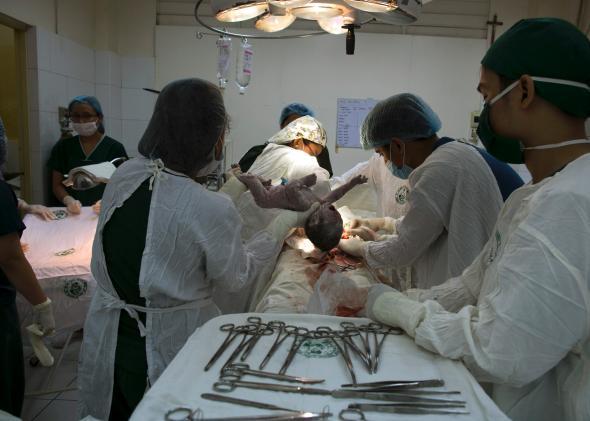Pregnant women are sometimes cautioned against travelling abroad for health and safety reasons, but here’s a new one: Don’t travel abroad while pregnant because you could have your baby forcibly removed from your womb. That’s what seems to have happened to an Italian woman who, while pregnant and on a business trip to Britain, had some sort of mental health episode and was forcibly committed. While in the psychiatric hospital, Essex social services obtained a court order to force a C-section on the woman and take the newborn into custody. Now, 15 months later, the British still have the baby and the Italian woman, who says her bipolar condition is under control, is trying to get her daughter back, through both the Italian and British court system.
This is a crazy story—thank goodness it could never happen here! Except: In the U.S., declaring a fetus a “child” and using that status to deprive pregnant women of their right to control their own medical care has become downright routine. Susan Faludi sounded the alarm in her book Backlash, when she covered the 1987 case of Angela Carder, a cancer patient who died after George Washington University Medical Center obtained a court order to force her to have a C-section at 26 weeks gestation against her family’s wishes. (Unsurprisingly, the baby died within two hours after her birth.)
While the courts eventually found the hospital to be in the wrong, the subsequent years have demonstrated that Faludi was correct to see this as the beginning of a trend. Since then, there have been a series of moves, often orchestrated by the anti-choice movement, to chip away at a pregnant woman’s rights. Hospitals have obtained court orders to force women to undergo C-sections by arguing that the fetus’s right to be delivered that way overwhelms the mother’s right to refuse surgery. States have also passed a series of laws that allow doctors to force women into drug treatment by using the fetus’s rights as an excuse, even though at least one of the women who has endured this treatment was not addicted to drugs during her pregnancy at all.
As for the Italian woman’s case, in his original report for the Telegraph, Christopher Booker paints a picture of a judicial system that has batted away any argument for restoring the little girl to her birth mother:
In February, when the mother returned to Chelmsford to plead for the return of her daughter, the judge, I am told, admitted that, since resuming her medication, she seemed impressively articulate and a different person from the one he had seen earlier. But, because he could not risk a failure to maintain her medication in the future, he ruled that the child must be placed for adoption.
The mother, who it should be noted has other children that no one seems interested in removing from her custody, even produced American relatives of her oldest daughters who are willing to take the baby, but, according to Booker, British social services remains unmoved. Hopefully the outrage in the British press will help turn the tide in this woman’s favor and away from Britain’s “child protection” system.
The mother, who it should be noted has other children that no one seems interested in removing from her custody, even produced American relatives of her oldest daughters who are willing to take the baby, but, according to Booker, British social services remains unmoved. Hopefully the outrage in the British press will help turn the tide in this woman’s favor and away from Britain’s “child protection” system.
